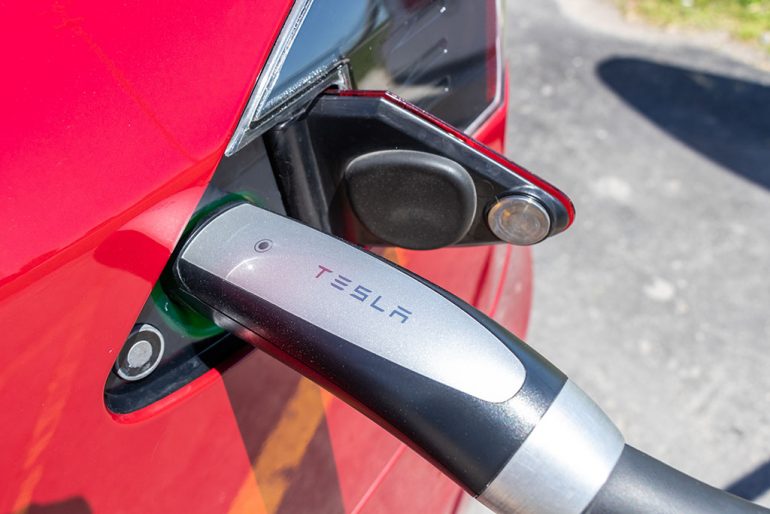
SAE International, a prominent U.S. automotive industry organization, has announced its intention to establish performance standards for Tesla’s electric vehicle (EV) charging plugs. This move signifies a significant step towards the widespread adoption of the Tesla plug across all EVs. The decision by SAE International comes shortly after Ford, General Motors, and Rivian declared their plans to join Tesla’s expansive Supercharger network and incorporate its North American Charging Standard connector into their upcoming electric vehicle models. However, it is worth noting that the rival connector known as CCS (Combined Charging System) will continue to be utilized in numerous existing EVs.
SAE International has stated that it is already actively working on developing the standards and aims to complete them within a span of six months. The established standards will cover various aspects, including the connection mechanism between the plugs and charging stations, cybersecurity measures, charging speeds, and reliability requirements. Frank Menchaca, the president of sustainable mobility solutions for SAE’s nonprofit parent company, expressed that the intention behind setting these standards is to facilitate seamless integration and harmonization among EV charging systems.
Also, don’t forget that you can get discounted new car pricing with a free quote through qualified local dealer partners.
According to Sam Abuelsamid, an e-Mobility analyst at Guidehouse Research, the introduction of SAE’s performance standards is likely to render CCS obsolete, given that the majority of consumers who have experienced both connectors would prefer Tesla’s NACS (North American Charging Standard) connector due to its user-friendly nature. Nonetheless, charging stations will need to support both plug types for the foreseeable future, as a significant number of vehicles are currently equipped with CCS connectors.
Menchaca emphasized that the development of these standards is being undertaken in collaboration with Tesla and industry engineers. He clarified that automakers and consumers will not be required to pay royalties to Tesla for utilizing the standardized connector, although EV owners will need to pay Tesla for charging services on its network. It should be noted that SAE International does not favor one specific connector over the other and intends to support the ongoing use of CCS.
Menchaca further explained that SAE is spearheading the standardization of NACS primarily due to its adoption by Ford, General Motors, and Rivian, and the indication that it is poised for widespread usage. The introduction of standardized performance standards is expected to offer increased choice, convenience, and access to a broader charging network. Menchaca acknowledged the possibility of additional automakers, such as Stellantis and Hyundai, transitioning to Tesla’s connector in the future.
Presently, with the exception of Tesla, the vast majority of automakers employ the CCS connector. Other manufacturers are interested in Tesla’s Supercharger network due to its extensive coverage of direct current fast-charging plugs, strategically positioned along major travel routes. As part of the recent agreements, owners of GM, Ford, and Rivian vehicles will gain access to over 12,000 Tesla Supercharger plugs. The Department of Energy reports that Tesla currently operates 1,797 Supercharger stations in the United States, boasting over 19,000 plugs.
While ChargePoint possesses the largest charging network in the United States, with over 32,000 stations and 55,000 plugs, the majority of them are Level 2 chargers, which necessitate longer charging durations of up to eight hours to reach full battery capacity. Nevertheless, the network of DC fast chargers is steadily expanding to meet the growing demand for faster charging options.
Industry analysts suggest that there is a growing momentum towards establishing Tesla’s connector as the standard in the United States. However, during the transition period, vehicles will likely need to be compatible with both Tesla’s NACS connector and the existing CCS connector.
General Motors and Ford have stated that they are not paying any fees to Tesla for accessing the Supercharger network, signaling a collaborative effort among industry players to facilitate a more unified and efficient charging infrastructure.
Source: APNews